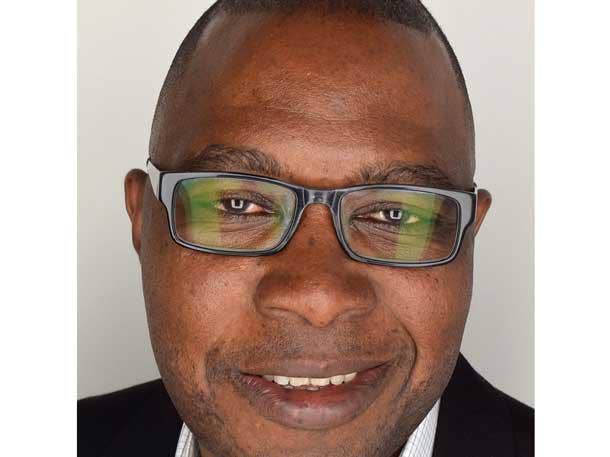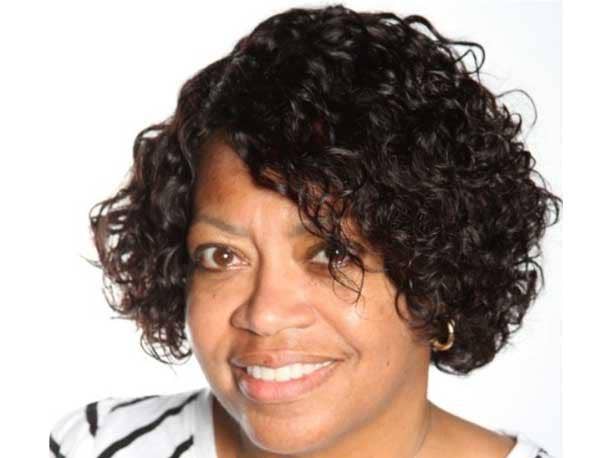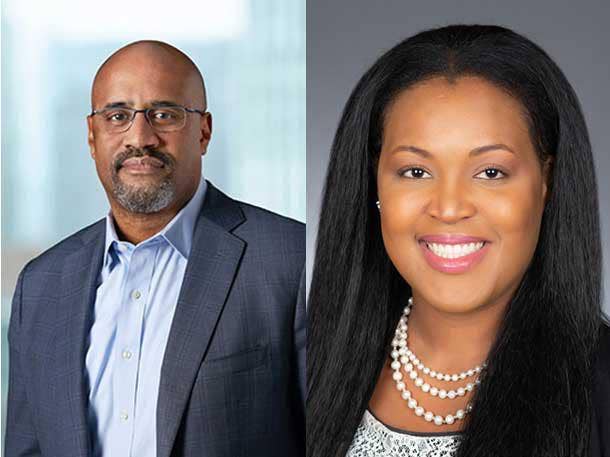Black History Month 2023: Partners, Vendors Share Stories From The Channel
Black professionals from One View Communications, Real Impact Technology Consulting, Imperva and Nozomi Networks talk about inclusivity and the channel.
Nyasha Tunduwani, CEO of Real Impact Technology Consulting, traces his passion for technology and running a partner business back to the entrepreneurial spirit his parents displayed as business owners in Zimbabwe.
Vanessa Carter, CEO of One View Communications, credits belief in herself, years of building relationships in the channel and a personal mission to better advocate for customers with fueling her own journey to starting a partner business.
And for Micheal McCollough and Roya Gordon, both landed at vendors with partner programs thanks to someone taking a chance on them earlier in their careers despite a lack of experience.
This Black History Month, CRN spoke with Black professionals in the channel about how they entered IT, reached milestones in their careers and industry efforts to create a more diverse and inclusive industry for service providers.
[RELATED: Black History Month 2023: Celebrating Influential Black Americans In Tech]
Black History Month And The Channel
While each of these professionals told CRN that representation in the channel has improved over the years – with newer, diverse faces more prevalent at conferences and in different roles at partner businesses and vendors – much work remains to increase the number of Black people and other underrepresented voices not only in the channel, but in science, technology, engineering and math (STEM).
Signs of disparity are easy to find. A January report from McKinsey estimates that 40 percent of Black American households lack high-speed, fixed broadband compared to 28 percent of white American households. In cities such as Chicago and Baltimore, Black households are twice as likely to lack a high-speed internet subscription compared to white ones.
Thirty-eight percent of Black households in the rural South lack broadband compared to 23 percent of white ones, according to the report. Sixty-nine percent of Black Americans have desktop computers or laptops compared to 80 percent of white Americans.
And about half of Black workers have advanced or proficient digital skills needed for the tech-driven economy compared to 77 percent of white workers. Black Americans are 13 percent of all workers but only 7.4 percent of digital workers.

Nyasha Tunduwani And The Black Channel Partner Alliance
For Nyasha Tunduwani, CEO of Real Impact Technology Consulting – a Seattle-based services provider whose partners include Microsoft – technology and entrepreneurship were a constant growing up in Zimbabwe.
When Tunduwani was about 13 years old, his family purchased a Commodore 64, which provided his earliest programming experience when he wasn’t simply enjoying video games like “Bruce Lee.”
By 16, he was helping his father with his medical parts store. His father sought any technology – from telex to fax machines – to stay ahead of the competition. And his mother owned a hairdressing salon and gas stations.
“My parents were really, really cool,” Tunduwani told CRN in an interview. “My mom was just phenomenally encouraging of anything that we chose to do. … Unfortunately, the reality is nothing truly prepares you to run your own business, other than running it. But I’d have a lot of exposure to businesses and there’s something I wanted to do.”
In the 1990s, Tunduwani moved to Seattle and worked in an Indian restaurant under the first Amazon office. An engineer with the company recommended that Tunduwani study HTML, the basic code that’s used to build a web page.
Tunduwani got jobs as a web developer and network administrator with online travel companies before starting his own consultancy and Lenovo reseller in 2003, according to his LinkedIn account.
That company that would eventually become Real Impact.
In June 2020 – one month after the murder of George Floyd by a police officer in Minneapolis – Tunduwani and others founded the Black Channel Partner Alliance to help bring more access to capital, markets and management education to Black professionals working in the channel.
“Part of the challenge a lot of companies in the channel are facing is we can‘t even identify the Black partners,” Tunduwani said. “So that was something that we sought to rectify.”
Tunduwani, the group’s president, is a founding member alongside Danny Brown, Lauren Anderson and Frank Valdivieso.
Multiple Microsoft executives were key to providing funding for the group, he said, including Lani Phillips, Microsoft’s U.S. channel sales vice president; Karen Fassio, Microsoft’s former director of worldwide go-to-market and digital channel sales; and former channel chief Gavriella Schuster.
For Tunduwani’s group, part of the mission is connecting Black channel partner business owners and executives with each other, he said. Relationships with more experienced business owners through professional groups have helped in his own career.
“You don‘t have to go out there and fight every battle yourself,” he said “You can just see other people’s battle scars and learn from them.”
The group also educates members on business growth opportunities such as offshoring to scale a business, co-selling with vendors and applying for government loans when available.
“These are lessons that are not out there floating in the public,” he said. “And if they are, they‘re surrounded by so much additional content that you can’t figure out what they are. So the benefit of having the communities these initiatives that have stood up is it makes it so that instead of trying to consume this sea of information, someone could say, ‘OK, this is what you have to pay attention to.’ Because that‘ll take you significantly less time.”

Vanessa Carter: ‘Don’t Be Afraid’
During her earliest years in the telecommunications industry, Vanessa Carter found herself trying to break into what she calls the “good ol’ boys network” of sales.
Carter had ascended the ranks of customer service and repairs and provisioning. But to finally get into outside sales, she turned to a recruiter friend to help improve her resume.
In 2012, Carter finally decided to go into business for herself to work more closely with end customers and deliver the best products from multiple vendors. She started One View Communications – a Glenwillow, Ohio-based services provider whose partners include Cisco and Juniper Networks.
If Carter could give her younger self advice, she’d say to speak up more and believe in yourself, she told CRN.
“Don‘t be afraid to ask the questions,” she said. “Don’t be afraid to grab a seat at the table. And don’t be afraid to raise your hand. You know your input is valuable. You were dead on in your thinking. Just speak up.”
While Carter still sees room for improvement for bringing more underrepresented people into the channel and tech overall – and supplying new business owners with more resources to help them succeed – she said that trade shows she attends are now more populated with a variety of faces, not just the white men who have dominated the space for so long.
“There‘s always going to be room for improvement,” she said. “But I have seen improvement. Each time that I visit like any of the expos or the shows, you see more and more females and Black females and young men, a lot of minorities. So that is changing. That was not the case many years ago when I first entered the channel.”
Carter would like to see companies strengthen their outreach to communities underrepresented in the channel. Working for a services provider can give young tech professionals a wide variety of experiences to prepare them for a fulfilling career, she said.
“For those who are just entering into the channel, it’s hard to tell what’s possible,” she said. “I would say to find a mentor. To find someone who can actually help you through the path. So it saves you some time. So it’s not going to take you years to understand the dynamics of maneuvering the channel.”

Micheal McCollough And Roya Gordon
Micheal McCollough and Roya Gordon told CRN similar stories about how someone took a chance on them early in their tech careers.
For McCollough – a channel chief at Imperva, a San Mateo, Calif.-based digital security vendor – it was the offseason from his career as a professional baseball player and he sought a job as help desk support. The person who gave him his first shot in the business became a mentor.
“I knew technology a little bit – I took some IT courses,” McCollough told CRN in an interview. “And he felt like I had a good customer service orientation about myself. And he gave me a chance. He gave me a chance.”
McCollough went on to work for Schlumberger for about five years, leaving in 2004 as managing director of network and infrastructure solutions. His next stop was Dell Technologies for about seven years, leaving in 2012 as director of managed services for the Asia Pacific and Japan (APJ) region.
And then he was with Akamai Technologies for more than eight years, leaving in 2021 with the title of global vice president of channels and alliances to take on his current position. His formal title with Imperva is global vice president of strategic growth.
For Gordon – operational technology (OT) and internet of things (IoT) security research evangelist at Nozomi Networks, a San Francisco-based IoT network threat detection vendor – a recruiter took a chance on her after she served in the United States Navy for about six years, leaving as an intelligence specialist, and got a master’s degree in global affairs.
“At the time I didn’t know what the different roles in cyber meant,” Gordon told CRN in an interview. “So I’m like, ‘I can research cyber stuff. It shouldn‘t be too hard.’ So I applied to it … completely unqualified for it. But she looked at it and she saw, ‘Wow, this person has great skills.’ She saw that another part of the lab was hiring a role that I could be a good fit for. So instead of just tossing it like, ‘I’m not going to get my money out of her, let me move on to the next (candidate).’ She really tried to bridge that gap between me and the hiring manager for that other role.”
Gordon also gave her persistence credit with landing the job at the Idaho National Laboratory – checking in when the lab took longer than promised to update her on whether she was hired.
She worked at the lab for more than two years as a control systems cybersecurity analyst. From there, she worked in cyber threat intelligence at Accenture for about three years before landing her current job with Nozomi last year.
“Had that not happened, I don‘t even know what I would be doing,” Gordon said.
McCollough and Gordon both lead diversity and inclusion initiatives at their vendors to help make breaking into technology possible for other underrepresented people in tech.
“I‘ve been in positions where I was deemed not technical, not smart enough, not taken seriously,” Gordon said. “And there wasn’t really a culture that was kind of helping me push through that. So if I can help create that kind of culture, that safe space for other diverse people in the company, then I want to do that.”
But they have advice to other employers looking to recruit underrepresented people into the channel and IT, not to mention more young people.
Vendors and channel partners should look to historically Black colleges and universities (HBCUs) for candidates, McCollough said. And they need to talk about the channel as an exciting opportunity.
“We need to make the channel a bit more exciting … helping people understand how the channel impacts organizations, managing ecosystems, how complex it is,” McCollough said. “The thing I love about my job – I have to play sales, marketing, operations, finance, product. … We need to do a better job of promoting that so that people of color can see, hey, you can really make an impact and a career in this space. Governance. Pricing strategies. It is rich.”
Smaller vendors and partners can also position themselves as worthy places for aspirational young professionals, he said.
“The young adults want to go to the Googles, the Facebooks, the AWSes and the Deloittes and the consulting organizations,” he said. “And what I‘m telling them is, ‘Yes, those are great companies, great brands. But you can also have a major impact in some of the smaller companies. Because the roles you play are sometimes more critical. And you could have a much bigger impact than maybe some of the bigger companies. And so we’ve been trying to work on that mindset or their perception bit by bit to get more diverse candidates into this field.”
Diversifying the employee base is not only a moral imperative for companies – teams made up of people from different backgrounds and experiences make the business stronger as well, he said.
“It challenges conventional thinking,” he said. “It prevents groupthink. And that‘s one of the things I love about diversity and inclusion, that people have to deal with things differently, or face different challenges, and that really makes the overall water rise for everyone because we’re all pushing each other to get better. It’s almost like a sports team.”
And for Gordon’s advice to young professionals breaking into tech, she recommends developing communication skills so they can translate between technical and nontechnical workers
Like Real Impact’s Tunduwani, she recommended networking with people in similar roles you want to reach one day. And like One View’s Carter, Gordon recommended speaking out when you can.
“Sometimes you don‘t have to be right,” Gordon said. “People just want to know that you’re thinking and you‘re suggesting ideas and you’re thinking outside the box. Whatever you say doesn‘t necessarily have to be the right thing or the idea that everyone runs with, but you’re putting your hat in the ring. And people like participation. … Be vocal because then you‘re remembered. And the next time you’re in a meeting, people, they know who you are.”